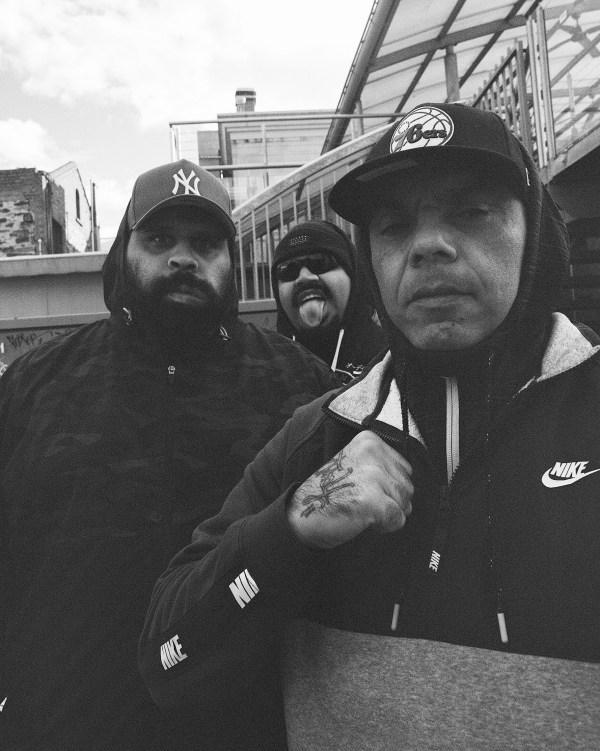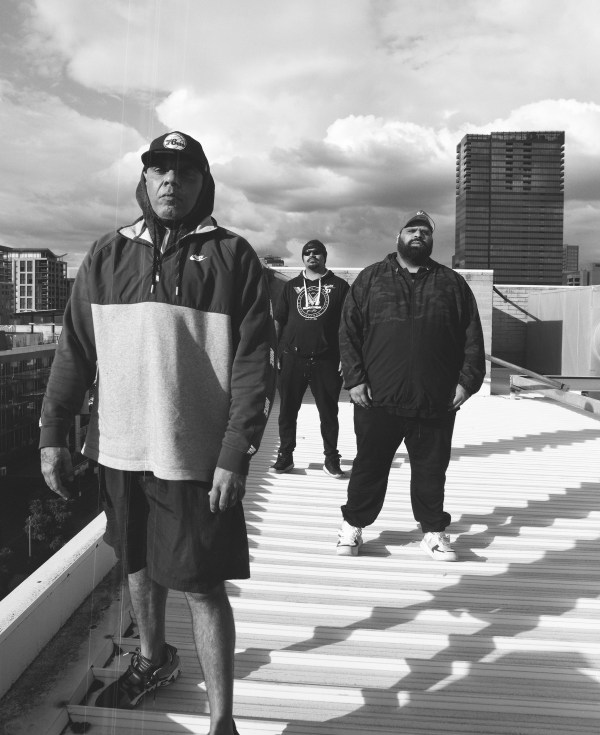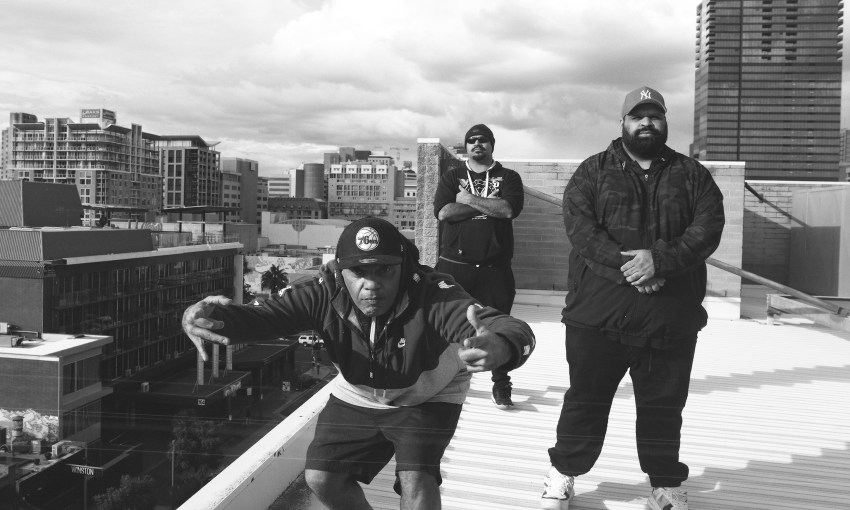First Nations hip-hop group Sonz of Serpent fuse boom-bap bars about the “urban Blackfella” with centuries-old cultural references. Ahead of the outfit’s hour-long WOMADelaide set this weekend, we spoke with one of the MCs about the northern suburbs, community and their debut album.
Three rappers commanding Dreamtime in real time
Sonz of Serpent puts language centre-stage.
The Indigenous hip-hop collective – comprised of three South Australian-based rappers: Native Emcee, Yowie and NativeSon91 – let their potent and powerful rhymes guide their music-making process. Their experience bleeds into the harmonics. Production is an after-thought.
Sonz of Serpent are playing at WOMADelaide 2022
11—14 March 2022
Tainmuntilla Adelaide Botanic Gardens, Adelaide 5000
More info here.
The nine tracks of their recently released debut album, …34 Minutes on the Northside, are filled with smooth archetypal Golden Age rap textures, like fractured piano chords, bursts of strings and vocal samples, and the occasional horn.
But it’s the boys’ bars, filled with first-person narratives of life in the northern suburbs, that makes their music whole.
“When we write, it’s all about our experiences as Blackfellas growing up here,” says Adnyamathanha and Ngarrindjeri musician Native Emcee, whose real name is Carroll Bright.
“Without putting too much crazy-ass negative spins and stuff [on it], we just try and really give insight. There’s never really been insight on the urban Blackfella in this modern day.
“I think it’s important for our youth… to hear their peers talking about social issues.”
Sonz of Serpent will perform with local instrumental five-piece Tervete Collective at world music festival WOMADelaide this weekend. The trio feature on a stacked bill alongside other well-known First Nations rappers, such as A.B Original, Baker Boy and Barkaa.
Sonz of Serpent speak about colonisation, police brutality and justice reform.
The track ‘TRUTH’, an homage to East Coast acolytes like Big Noyd, includes rhymes delivered with uncompromising bluntness. It is sharp in its criticism of the country’s refusal to acknowledge its settlement past, and how this affects young mob.
Big beats, horns and crisp pads soften the lyrical blow of its stark imagery: ‘We seen dark days, cold winter, no light / struggle to keep the help we’re treated like low life’.
—Native Emcee
Songs like ‘CHECKING IN’ – featuring distorted, gauzy production by Tongan musician Lonelyspeck – tackle tales of wealth and social equity, but also the power of Aboriginal culture and how it can be elevated to overcome adversity. Lines like ‘Grew up dirt poor but knowledge was a deep well’, which rise above messy keyboard samples, are emblematic of the group’s potency.
Sonz of Serpent are part of an emerging generation of Aboriginal and person-of-colour rappers and producers in Australian hip-hop. Such voices have always been a part of the genre, but in the mainstream, white artists have historically been a dominant fixture.
Many of Sonz of Serpent’s contemporaries in this new wave can be seen in WOMAD’s Indigenous-heavy rap lineup this year.
Native Emcee was drawn into the world of US hip hop at age eight. The genre’s ability to tap into his reality, the Black experience, made him feel less alone.
“It felt that the music was tailored to me,” he says. “The music that I heard, the lyrics that I heard, coming from another minority group from very similar social issues that we go through, that’s the stuff that really drew me to that music and made me feel like a part of something.”
After soaking in American culture as a young person (he liked to graffiti, too), Native Emcee decided to to give music-making a crack. But he wanted it to speak to his surroundings.
“Instead of just relating to certain parts of other peoples’ music, let’s try and make some music for our own,” he says of his Indigenous storylines. “It all started from there.”

“The serpent is a sacred animal,” Native Emcee says.
Native Emcee founded Sonz of Serpent with NativeSon91 three years ago. The duo discovered a natural chemistry; their flow was electric, and their couplets bounced off each other when in close proximity. but early on, life got in the way and the project was put on the back-burner.
Eventually, life was reorganised and NativeEmcee and NativeSon91 started going to open-mic nights again.
“We were getting together on Friday and Saturday nights and vibing off each other,” Native Emcee says.
“And then one thing led to another, [and we] made one track and made another one and looked at each other, and we were getting really good responses from the people that were seeing us live,” he says.
“And we just thought, ‘Hell, let’s give it another shot and see what happens’.”
They brought in the group’s third member, Yowie, and the result is …34 Minutes on the Northside, which was released last December.
The record’s name is a nod to their music being forged in the northern suburbs – an area, they believe, that’s not getting the recognition it deserves.
The song ‘CHECKING IN’ was made at Northern Sound System, and describes where the group sees itself in the city’s greater music-making tapestry.

“People from the north aren’t really celebrated a lot for it,” Native Son says of Adelaide’s northern hip hop scene.
“I don’t really see the local young fellas down here [have their] names on bills and stuff.
“It’d be nice to just try and reinvigorate that passion down here.”
While Sonz of Serpent lyrically articulate their modern experience, tracks like ‘DARKSIDE’ include more traditional elements, such as didgeridoo riffs. The ‘serpent’ also fits into the group’s representation of culture, appearing in the band’s name and thematically in songs like ‘NOT MANY’.
“The serpent is a sacred animal,” Native Emcee says.
“It’s not a typical name. It represents our people.”
Read more about WOMADelaide 2022 here.
CityMag asks Native Emcee what people should expect from the group’s WOMAD set this weekend. “It’s all about that ‘90s, Golden Era, gritty, smooth boom-bap with dope deliveries and well-thought-out punch lines and things of that nature,” he says.
The aim is to create connection in the crowd. Their performance is for all the people that love hip hop and what it represents – dealing with struggles through sound.
“Hip hop was created as a community-based thing. Not an individual,” he says.
“It’d be pretty awesome to see a really dope community being brought together from one common thing, which is our love for the genre.”




